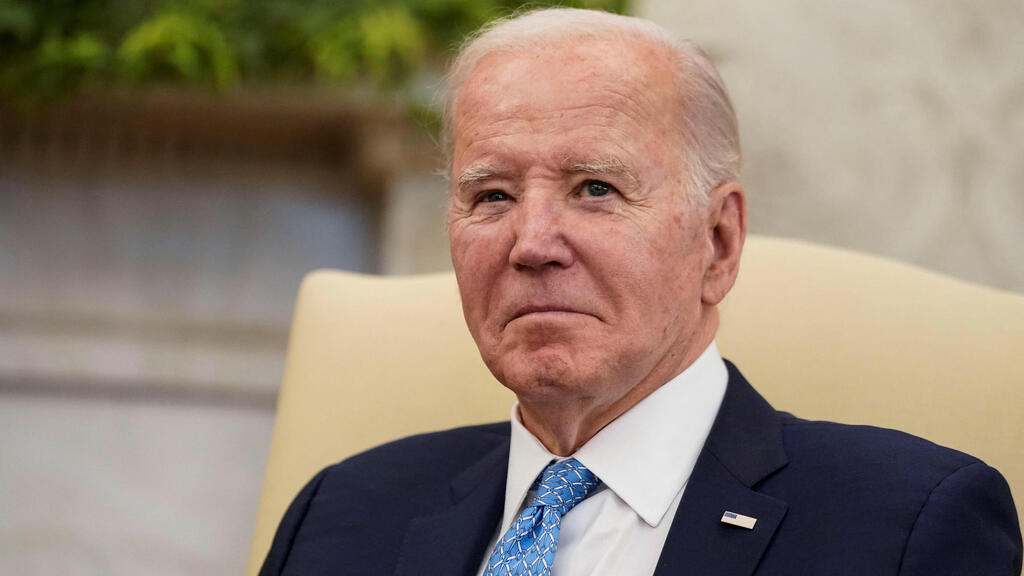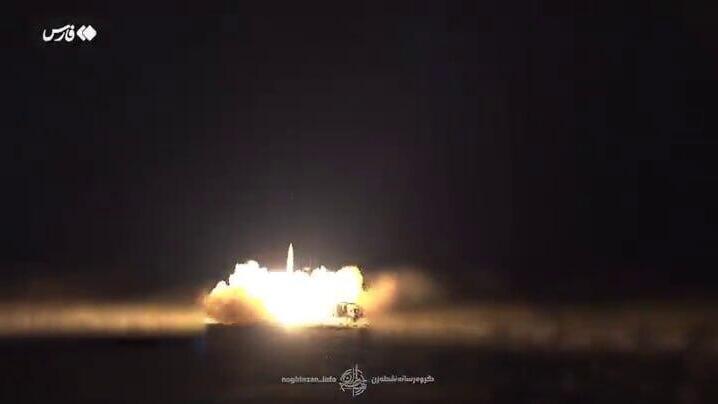Thomas Friedman, the New York Times opinion columnist who is generally considered the mouthpiece of U.S. President Joe Biden, wrote on April 26 that Israel faces a choice between going into Rafah or normalizing relations, including security ties, with Saudi Arabia. The “Biden team wants… to offer this choice publicly so that every Israeli can see it.” The article goes on to state that pushing into Rafah “will only compound Israel’s global isolation and force a real breach with the Biden administration.” Moreover, Friedman wrote, “U.S. officials tell me that if Israel does mount a major military operation in Rafah, over the administration’s objections, President Biden would consider restricting certain arms sales to Israel.”
Clearly the Biden administration has now resorted to political blackmail to get its way. Accordingly there is only one correct choice for Israelis and it is the one Biden has selected for them.
2 View gallery


U.S. President Joe Biden is concerned about his reelection prospects
(Photo: REUTERS/Elizabeth Frantz)
However, on closer examination, the U.S. preferred plan is merely a poison pill laced with three layers of utopian bliss. The first is an Arab peacekeeping force that could replace Israeli troops in Gaza so that Israel can get out and not be stuck occupying both Gaza and the West Bank forever. The second is the U.S.-Saudi-Israeli-Palestinian diplomatic-security deal [a euphemism for the two-state solution] that the administration is close to finalizing the terms of with the Saudi crown prince. And last, the U.S. would bring together Israel, Saudi Arabia, other moderate Arab states and key European allies into a single, integrated security architecture to counter Iranian missile threats the way they did on an ad hoc basis vis a vis the Iranian attack of April 14.
All of these “goodies” hinge of course on one crucial element— the IDF forgoing a Rafah assault which in effect means a de facto cease-fire. Taming the IDF will give the Biden election campaign, so it hopes, a perceptible boost among Muslim and “progressive” voters. More importantly, Biden fears that the potential negative consequences of an IDF attack in Rafah— e.g. a high civilian toll—would doom his second presidential bid.
If there was any doubt that a cease-fire was the sine qua non to reaching Biden’s “promised land,” it was dispelled when the president, according to the (last line!) of the White House’s official readout, reiterated his “clear position” on the Rafah issue during his phone call with Netanyahu on April 28. He also stressed the importance of reaching “an immediate and sustained cease-fire in Gaza” ostensibly to get “relief for the people” there in phone calls he made to leaders of Egypt and Qatar the next day. Biden promised that the United States “would work to ensure the full implementation of its [the cease-fire] terms.”
Even if the “integrated security architecture” comes into being to protect Israel, it would be hardly a panacea insofar as the main security threats Israel is facing – i.e. Iran’s efforts to confront it with a “ring of fire” comprised of its proxies in Gaza, Lebanon, Syria, Iraq, Yemen and the West Bank (with Jordan clearly in the making), its drive to nuclear weapons, and its growing ballistic missile arsenal.
Recall that only Israel’s air defenses were able to tackle the barrage of surface-to-surface missiles fired by Iran on April 14. Iran launched 110 ballistic missiles of which about half failed, by U.S. account. That would have left some 55 which made their way to Israel. If nine had penetrated the Israeli missile defenses, as multiple sources indicate, the systems’ interception-rate was 84% not 99% as claimed.
Even if one missile with a 750kg conventional warhead hit an Israeli city, the impact could have been disastrous. As BBC correspondent James Landale reported on April 26, “I watched from our office in Jerusalem as the night sky was lit up by Israeli air defenses trying to bring down the ballistic missiles flying overhead. All it would have taken is for one GPS guidance system to fail for a missile to land in an urban area at huge civilian cost.”
Yet this scenario would become downright nightmarish if the Iranians could arm their missiles with nuclear warheads and just one made it to target. As has been already pointed out, Iran is the only country to have developed a 2,000-kilometer-range missile without first having developed nuclear weapons.
In fact, one of the weapons used in the Iranian attack, the Emad medium-range ballistic missile (MRBM), has a diameter of 125cm – the precise dimension of a nuclear warhead design which the Iranians explored, according to one of documents stolen by Israel’s Mossad intelligence agency from Iran in 2018.
If anything, Tehran incentives to go nuclear must have become stronger given the U.S.-backed coalition being erected to contain it.
Moreover, it might be noted that the other MRBM used in the Iranian attack was the Kheibarshekan (Kheibar buster), so labeled in reference to a Jewish oasis called Kheibar that was overrun by Muslim warriors in the 7th century.
What is perfectly clear at the present time is that the deployment of over 100 ballistic missiles in a single wave suggests that previous estimates that Iran has about 3,000 ballistic missiles stockpiled are probably accurate, and could even be on the low end. Also, the firing of over 100 ballistic missiles in the space of a few minutes suggests Iran has at least 100 launchers.
The April 14 attack might thus have been a test run.
Worse yet, the Biden plan is another chapter in the catastrophic effort by President Barack Obama to place Israel squarely into a defensive posture by aggressively promoting Israel’s efforts to develop a missile defense system. The idea was to minimize Israel’s incentives to undertake offensive military actions so as to inhibit any surprises that might end up jeopardizing American troops and assets in the region. But the deployment of the missile defense system was the turning point in Israel tolerating the mushrooming of the now existential threats posed by the likes of Iran-backed Hamas and Hezbollah.
The Biden version holds that Israel should forgo any offensive plans against Iran now that it can supposedly rely on an international “integrated security architecture” to protect it. Already Israel has uncharacteristically become dependent on international support to protect its skies as evidenced by the interception of Iranian drones and cruise missiles on April 14. As Biden reportedly told Netanyahu in the wake of Iran’s attack: “Take the win!”– representing the culmination of Washington’s upside down world where an effective defense in now hyped as a victory.
Biden’s approach is also a confirmation that the U.S. is unlikely to confront Tehran if the latter dashes to the bomb. Even when his stern warning of “Don’t!” to Iran and its proxies was breached, the U.S. response was defensive as the April 14 scenario has clearly indicated. Instead the president invested his energies in efforts to restrain Israel from launching a forceful response to the unprecedented Iranian assault.
The inescapable conclusion is that Biden’s “grand design” is a pipe dream inadequate for coping with the ever-growing threat to Israel’s existence which Iran and its proxies are daily perfecting. In fact, the plan aggravates Israel’s strategic circumstances by his administration’s insistence on a two-state solution as a prerequisite for the geopolitical “architecture” that would guarantee its future.
All this maneuvering is designed to reach a cease-fire in Gaza – which Washington hopes would be promptly followed by a truce with Hezbollah as promised by its leader Hassan Nasrallah – so that Biden’s bid for a second term will not be hindered.
The Biden offer comes at an exorbitant cost, yet the merchandise it is peddling is woefully defective and must be recalled.
Dr. Avigdor Haselkorn is a strategic analyst and the author of numerous publications on national security issues.


